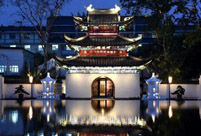 YOG kicks off in Nanjing
YOG kicks off in Nanjing
 Colorful life at Youth Olympic Village of Nanjing 2014 YOG
Colorful life at Youth Olympic Village of Nanjing 2014 YOG
 Royal Taoist temple to open to public
Royal Taoist temple to open to public
 Female soldiers at quake-hit area
Female soldiers at quake-hit area
 Shocking photos of cruel battles in Ukraine
Shocking photos of cruel battles in Ukraine
 Amphibious armored vehicle unit conducts open sea drill
Amphibious armored vehicle unit conducts open sea drill
 Water relay in Henan
Water relay in Henan
 Ethnic culture feasts eyes of travelers
Ethnic culture feasts eyes of travelers
 80 security dogs assembled in Nanjing police dog training base
80 security dogs assembled in Nanjing police dog training base
 Graffiti artists paint on street walls in Xinjiang
Graffiti artists paint on street walls in Xinjiang
BEIJING, Aug. 21 -- At the seminar marking late leader Deng Xiaoping's 110th birthday on Wednesday, Chinese President Xi Jinping summarized six aspects of Deng's political legacy, one of which is Deng's strategic thinking.
It is the first time the Chinese leadership mentioned strategic thinking as one of Deng's political legacies. It is not only about the wording, but closely relates to the current situation in which China needs to address various issues by embracing Deng's approach.
Deng and his comrades saved China at a critical time in the country's history, not by small repairs, but with systematic methods and visionary designs.
Deng's reform concerned almost all aspects of the country, from science and technology to ideologies, from industrial powerhouses to the most rural areas.
Deng took all aspects into the greater picture, and made breakthroughs on easier issues at the beginning. With comprehensive and strategic thinking, he led the country on its way to prosperity.
In the new century, the country has always vowed reform, but in many aspects, reforms have yet to reach people's expectations. In health, education, income distribution and many other fields, people are still making complaints.
China began a new round of reforms after the transition of Communist Party and state leadership in late 2012 and early 2013. A package of reform policies have also been announced and some have been implemented.
Like Deng's approach, the current reforms are not simple repairs of current policies.
In a key decision made at the Third Plenary Session of the 18th Central Committee of the Communist Party of China in November last year, a total of 60 missions were clearly laid out. Simple and separate reforms cannot succeed as almost all state issues are interconnected.
At the plenum, the central leadership vowed to strengthen independence of local governments from China's judicial system. Reform of the administrative system will cut governments' power, empowering the market instead. In addition, many changes will be directed toward State-owned Enterprises.
All the reforms involve various departments, levels of governments and interests groups, which require the central authorities to view them in the bigger picture and the political courage to implement.
In this sense, Xi's mentioning of strategic thinking has its practical significance. Xi has in several occasions stressed the importance of top-level design, which was in essence follows Deng's forward-looking strategic thinking.
Reform is never an easy task, especially in a country as big and complicated as China. Reviewing Deng's legacy gives the current Chinese leadership a wise methodology and experience to carry on reform tasks.
Although the situations are different, the essence of Deng's statesmanship will always serve as a lighthouse for which progress can follow.
 Beautiful night scenery of Nanjing
Beautiful night scenery of Nanjing Passenger transport starts on Tibet's new railway
Passenger transport starts on Tibet's new railway Story of outstanding Beijing swat sniper
Story of outstanding Beijing swat sniper Beautiful policewoman in an anti-terrorism SWAT team
Beautiful policewoman in an anti-terrorism SWAT team Cute photos of little Taoist nuns and monks go viral online
Cute photos of little Taoist nuns and monks go viral online Amphibious armored vehicle unit conducts open sea drill
Amphibious armored vehicle unit conducts open sea drill A post-90s girl who takes grandma to work
A post-90s girl who takes grandma to work Beijing policewomen posters become a hit
Beijing policewomen posters become a hit Photo story: How a baby panda grows up
Photo story: How a baby panda grows up Star-leveled nursing home in a small county
Star-leveled nursing home in a small county Evidence of monstrous crime of Japanese invaders
Evidence of monstrous crime of Japanese invaders Foreign models compete with Chinese in Cheongsam show
Foreign models compete with Chinese in Cheongsam show The beautiful pictures of ancient Chinese architecture
The beautiful pictures of ancient Chinese architecture The Muslims involved in relief work
The Muslims involved in relief workDay|Week|Month